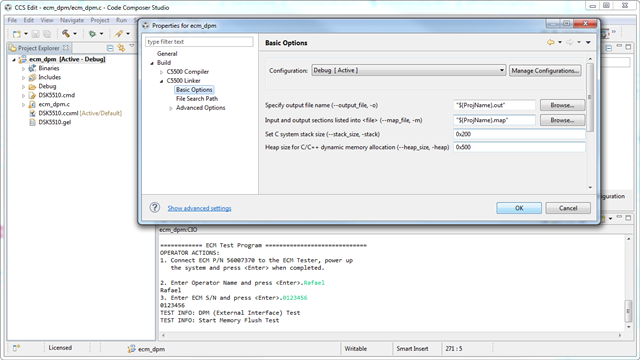We purchased a brand new 5510DSK (MFG P/N: TMDSDSK5510) from Spectrun Digital recently. The purpose of the board is to test 256K of external asyncSRAM (32-bit) connected to the EMIF. I am using CE2 for the memory starting at addr 0x400000. I wrote the program (see attachment), right or wrong I can’t tell but I am able to configure the EMIF using the CSL (I examined the registers inside CCS and verified they have the correct values as programmed). Where can I find examples on simple write/read to the external async memory? Slow speed is OK. Just need to do write/read to/from memory locations.
ecm_dpm.zipProblems/Questions:
- Functions getchar and gets (ecm_dpm.c line#270, 272 & 275) don’t work. When the program is executed, they are skipped.
- At ecm_dpm line #320 passes the parameter MEMORY_SCOPE_KB (non zero) to the function MemoryFlush. When MemoryFlush gets that passing parameter, it is always zero. Seems to me that passing parameters are always zero’s.
- Are the cmd and gel files correct? The cmd file is recommended to be used by a TI person. Different examples use different cmd files that are quite different. Are there any guidelines on cmd file. Based on what I try to do, is my cmd file okay?
- In CCS Memory Browser, it shows 3 types of memories: PROGRAM, DATA and IO. I know the IO is for the control registers. What are PROGRAM and DATA? For the external asyncSRAM, will it be under PROGRAM or DATA?
Note: I use the TMS320C5500 Chip Support Library for my program, it should be installed in C:\ti\ccsv5\c5500\C55xxCSL\lib in order for my program to build



